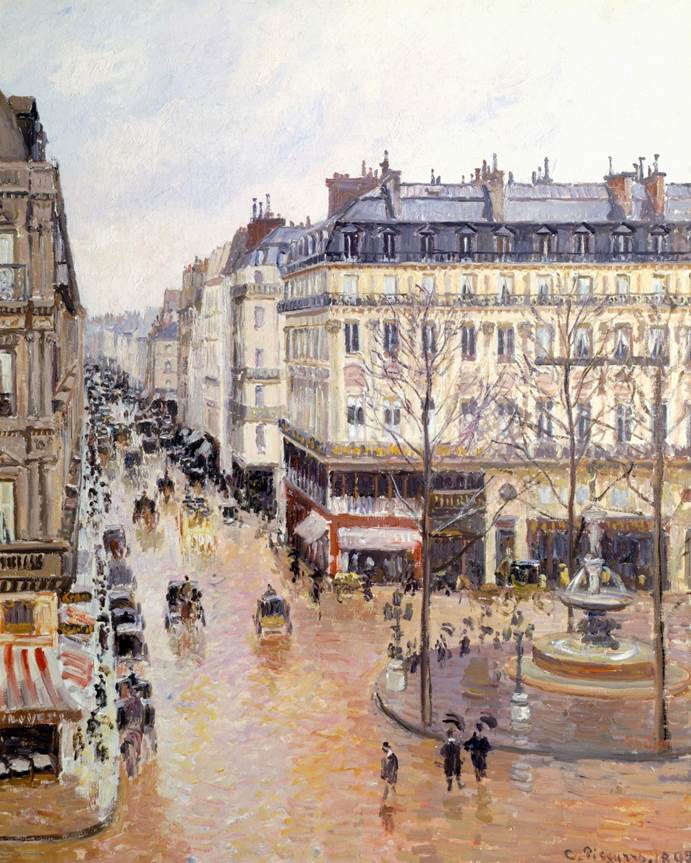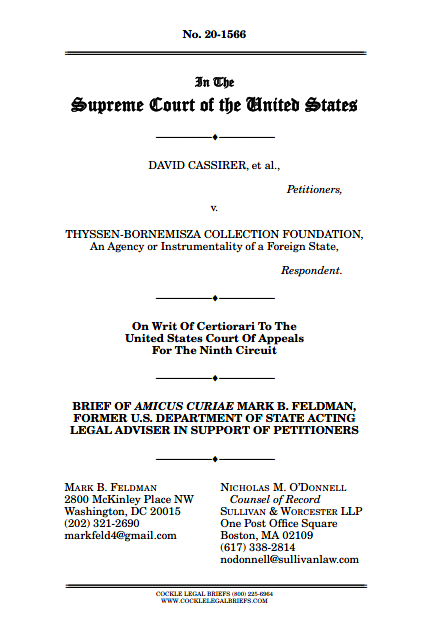I recently tackled the public discussion in Germany about whether to rename the Stiftung Preussischer Kulturbesitz, the foundation that oversees the State Museums of Berlin and some of the most remarkable collections in the world. Readers of the Art Law Report will know this name well, the SPK is the defendant in the lawsuit brought by my clients for the restitution of the Welfenschatz, or Guelphe Treasure, that the Supreme Court heard in 2020. While I've never been shy about criticizing the SPK about its approach in our our case (which is on appeal, briefs here and here), this piece addresses a different question. Namely, what place does the name "Prussia" have in the 21st century? For anyone like me who still thinks about the historical sliding doors of the Grossdeutschelösung and Kleindeutschelösungdebate of the 19th century about how to unite the German-speaking states and duchies, this piece is for you.
Read More
Topics:
Holy Roman Empire,
Prussia,
"Elephant Mural",
Martin Luther,
Stiftung Preussischer Kulturbesitz,
Sueddeutsche Zeitung,
Hermann Goering,
Der Spiegel,
Prussian Cultural Heritage Foundation,
Andy Warhol,
Welfenschatz,
Humboldt Forum,
C. Montgomery Burns,
Claudia Roth,
Siam,
Sigismund of Luxembourg,
Friedrich VI,
Hohenzollern,
Brandenburg,
Kaliningrad,
Augustus II the Strong,
Nefertiti,
Pergamon Altar,
Annalena Bärbock,
Monika Grütters,
Götz Aly,
Joseph Beuys,
Königsberg,
Nazism,
Konrad Adenauer,
Hermann Parzinger,
Luf Boat,
Bild
Today I am pleased to announce that I have filed a brief in the Supreme Court of the United States as counsel of record for amicus curiae Mark B. Feldman, former U.S. Department of State Acting Legal Adviser. We filed the brief in the case of Cassirer et al. v. Thyssen-Bornemisza Collection Foundation (“TBC”). Cassirer is the long-running dispute over title to Rue St. Honoré, après-midi, effet de pluie (Rue St. Honoré, Afternoon, Rain Effect) by Impressionist painter Camille Pissarro. The painting once belonged to Lilly Cassirer, a Jewish woman in Berlin in 1939, from whom Nazi agents “bought” the painting. The case before the Supreme Court is not about whether the painting was stolen—it is undisputed that it was. Rather, the Supreme Court will review the Ninth Circuit’s decision that Spanish law, not California law, should govern the ownership rights.
Read More
Topics:
Lilly Cassirer,
Foreign Sovereign Immunities Act,
Supreme Court,
SPK,
Stiftung Preussischer Kulturbesitz,
Hermann Goering,
FSIA,
expropriation exception”,
sovereign immunity,
UNESCO,
Rue St. Honoré,
Camille Pissarro,
Baron Hans-Heinrich Thyssen- Bornemisza,
Cassirer v. Thyssen-Bornemisza Collection,
Welfenschatz,
Jakob Scheidwimmer,
Philipp v. F.R.G.,
Mark B. Feldman
(WASHINGTON-October 22, 2020) The heirs to the Jewish art dealers who were forced to sell the medieval devotional art collection known as the Welfenschatz (in English, the Guelph Treasure) to agents of Hermann Goering in 1935 filed their brief today in the Supreme Court of the United States. It can be viewed at this link. The Supreme Court is set to hear argument on December 7, 2020, on whether the Foreign Sovereign Immunities Act (FSIA) and its “takings clause” create jurisdiction over the heirs’ claims for restitution of the Welfenschatz—as all reviewing courts so far have held. The Welfenschatz is held by the Stiftung Preussischer Kulturbesitz (in English, the Prussian Cultural Heritage Foundation).
Read More
Topics:
Third Reich,
Gestapo,
Z.M. Hackenbroch,
Prussia,
Germany,
Nazi-looted art,
Foreign Sovereign Immunities Act,
Markus Stoetzel,
Supreme Court,
Mel Urbach,
SPK,
Nuremberg race laws,
Stiftung Preussischer Kulturbesitz,
Hermann Goering,
FSIA,
NS Raubkunst,
Sullivan & Worcester LLP,
J.S. Goldschmidt,
Gerald Stiebel,
Prussian Cultural Heritage Foundation,
Adolf Hitler,
Nicholas M. O'Donnell,
Alan Philipp,
Welfenschatz,
I. Rosenbaum,
Paul Körner,
Wannsee Conference,
Jed Leiber,
House of Brunswick (Braunschweig)-Lüneberg,
Emily Haber,
Wilhelm Stuckart,
Final Solution

The U.S. Court of Appeals for the Ninth Circuit yesterday affirmed the 2019 judgment that allowed the Thyssen-Bornemisza Collection Museum in Madrid to retain Camille Pissarro’s Rue St. Honoré, après-midi, effet de pluie (Rue St. Honoré, Afternoon, Rain Effect) (1892), a painting sold under duress by Lilly Cassirer to a Nazi in 1939. Absent rehearing by the full Ninth Circuit or Supreme Court review, the decision may bring to an end the Cassirers decades-old effort to win restitution of a painting that no one disputes is Nazi-looted art, yet the museum refuses to return. The result turns on the highly deferential standard of review for findings of fact by the trial court about the state of knowledge by Baron Hans-Heinrich Thyssen-Bornemisza when he acquired the painting in 1976. Yet the Ninth Circuit’s lack of enthusiasm for this result fairly leaps off the page, however, first with its decision to issue an unsigned opinion not for publication, and by seconding the District Court’s disappointment in the ruling under review “that Spain and TBC’s refusal to return the Painting to the Cassirers is inconsistent with Spain’s moral commitments under the Washington Principles [on Nazi-Confiscated Art] and Terezin Declaration.” The Court of Appeals’ statement about Spain and the museum that “It is perhaps unfortunate that a country and a government can preen as moralistic in its declarations, yet not be bound by those declarations” is a reminder of the limitations of these moral imperatives that, ironically, many current possessors argue are sufficient to address the problem of Nazi-looted art. It is absolutely true that moral principles often do not have the force of law. It is equally true, however, that flouting moral principles warrants moral sanction. And as multiple judges of the United States have found, Spain deserves just that.
Read More
Topics:
Terezin Declaration,
Thyssen-Bornemisza Collection,
Rue St. Honoré après-midi êffet de pluie,
Claude Cassirer,
Cassirer,
Foreign Sovereign Immunities Act,
Washington Principles on Nazi-Confiscated Art,
Stiftung Preussischer Kulturbesitz,
FSIA,
expropriation exception”,
Baron Hans-Heinrich Thyssen- Bornemisza,
Welfenschatz,
A Tragic Fate,
Reichskammer der bildenden Künste,
Jakob Scheidwimmer,
Reich Chamber of the Visual Arts,
Madrid
(WASHINGTON-July 2, 2020) The United States Supreme Court today agreed to hear the appeal by Germany and the Stiftung Preussischer Kulturbesitz (SPK) seeking to dismiss the restitution claim by the heirs to the so-called Guelph Treasure (known in German as the Welfenschatz). The claims arise out of the forced transfer in 1935 of the Guelph Treasure by a consortium of Jewish art dealers to agents of Hermann Goering, who personally presented it as a gift to Hitler. In 2018, the Court of Appeals for the D.C. Circuit held that U.S. courts have jurisdiction over the claim under the Foreign Sovereign Immunities Act of 1976 (FSIA). That appellate court had rejected the Defendants’ arguments that U.S. courts lack jurisdiction, and that Germany’s treatment of its Jews in the 1930s should be immune from judicial scrutiny.
Sullivan partner Nicholas M. O’Donnell said, “we are grateful for the opportunity to address the Supreme Court on these important questions about holding Germany accountable for its Nazi-looted art. A 1935 transfer from German Jews to notorious art looter and war criminal Hermann Goering is the quintessential crime against international law, regardless of Germany’s Holocaust distortion in defending this case. Germany seeks to eliminate recourse for Nazi-looted art and the Court will have the chance to answer this question of critical importance for Holocaust victims.” O’Donnell added, “this is also an opportunity to rebuke the Department of Justice and State Department, who turned their back on decades of U.S. policy by siding with Germany’s effort to keep Nazi-looted art.”
Read More
Topics:
United States Supreme Court,
Nazi-looted art,
Department of Justice,
SPK,
Stiftung Preussischer Kulturbesitz,
Hermann Goering,
NS Raubkunst,
Gerald Stiebel,
Prussian Cultural Heritage Foundation,
Federal Republic of Germany,
Alan Philipp,
Welfenschatz,
State Department,
Paul Körner,
Jed Leiber
On behalf of my clients seeking restitution of the Guelph Treasure, or Welfenschatz, we filed today our supplemental brief with the U.S. Supreme Court in response to the Brief of the United States as Amicus Curiae that the Solicitor General’s office submitted on May 26, 2020. You can read today’s brief here, and read more about the particular problems with the Solicitor General’s filing here, most notably the contention that the Nazis’ property crimes against German Jews should be considered a “domestic” issue that doesn’t implicate international law under the Foreign Sovereign Immunities Act (FSIA). It was particularly distressing that the brief was signed not only by the U.S. Department of Justice, but also the State Department.
The filing follows an increasing pattern of disregard for bipartisan Congressional action, in this case the 2016 Holocaust Expropriated Art Recovery Act. Similarly, the 2017 Justice for Uncompensated Survivors Act that was enacted specifically to counter Poland’s and others’ hostility to restitution for Holocaust era assets has been ignored. The JUST Act required that the State Department issue a report on other countries’ restitution progress no later that November 9, 2019, yet no report has been issued. The State Department has a dedicated page on the JUST Act...which simply lists the law (Poland's embassy has its own rather self-serving version too). Something very curious is going on with restitution at the State Department, all the more heartbreaking given the 80 years of leadership on the topic by the United States.
Read More
Topics:
Foreign Sovereign Immunities Act,
Supreme Court,
SPK,
Stiftung Preussischer Kulturbesitz,
FSIA,
Welfenschatz,
State Department,
HEAR Act,
JUST Act,
solicitor general

Late Tuesday evening—the day after Memorial Day no less—the United States Office of the Solicitor General filed a brief amicus curiae in our clients’ pending case against the Federal Republic of Germany and the Stiftung Preussischer Kulturbesitz for restitution of the Guelph Treasure (in German, the Welfenschatz). This brief was in response to the Supreme Court’s invitation in January that the SG file a brief expressing the views of the United States. In an unprecedented abdication of 80 years of leadership redressing Nazi-looted art, the Solicitor General argued that there is no circumstance in which a Nazi-forced sale victimizing a German Jew in the 1930s could constitute a violation of international law such the Foreign Sovereign Immunities Act would confer jurisdiction over either Germany or the SPK. The U.S. government has taken the position that only property claims against non-Germans suffice—even though, of course, the U.S. government has acknowledged in every relevant context since the early 1940s that Jews ceased to be full members of German society on the day Hitler assumed power: January 30, 1933. This is an historic disgrace. Germany has rightly been shamed for minimizing in court over the last five years the genocidal character of its persecution against Jews, but for the United States to do so the day after we rightly honored the hundreds of thousands of Americans who died to defeat Nazi Germany is appalling.
Read More
Topics:
Monuments Men,
Foreign Sovereign Immunities Act,
Washington Conference on Holocaust Era Assets,
Supreme Court,
Holocaust Victims Redress Act,
Stiftung Preussischer Kulturbesitz,
Hermann Goering,
FSIA,
Monuments Fine Arts and Archives Program,
Washington Principles,
Federal Republic of Germany,
Welfenschatz,
Military Government Law 59,
Holocaust Expropriated Art Recovery Act,
HEAR Act,
Wannsee Conference,
D.C. Circuit,
Military Government Law No. 59,
london declaration
The Stiftung Preussischer Kulturbesitz (Prussian Cultural Heritage Foundation, or SPK) in Berlin announced that it had agreed to restitute a 1537 painting of the biblical figure Lot by Hans Baldung Grien to the heirs of Hans Purrmann, a German painter persecuted as a “degenerate” artist in the infamous Nazi action of the same name. Purrmann sold the Grien painting in 1937.
Read More
Topics:
Berlin,
Expressionist,
Hildebrand Gurlitt,
Nazi-looted art,
Max Beckmann,
Karl Buchholz,
SPK,
Stiftung Preussischer Kulturbesitz,
Hermann Goering,
Kirchner,
Degenerate Art Action,
Prussian Cultural Heritage Foundation,
Raubkunst,
Welfenschatz,
Hans Purrmann,
Neue Sachlichkeit,
Freund,
Han Baldung Grien,
Ferdinand Möller,
Bernhard Böhmer,
New Objectivity,
Grosz
The U.S. Court of Appeals for the D.C. Circuit today dismissed the petition to rehear en banc last year’s landmark ruling that the heirs of the art dealers who sold the Guelph Treasure (or Welfenschatz) may pursue their claims in U.S. federal court. Defendants the Federal Republic of Germany and the Stiftung Preussischer Kulturbesitz (the SPK, or Prussian Cultural Heritage Foundation in English) had argued that claims under the Foreign Sovereign Immunities Act’s expropriation exception such as these are not violations of international law and also require a claimant to exhaust remedies abroad, a position rejected by prior decisions of the D.C. Circuit and by today’s ruling as well.
Today’s decision confirms the first-of-its kind holding last year that a German state museum must face claims based on allegations of Nazi-looted art, a direct result of Germany’s failures through its so-called Advisory (often called Limbach) Commission to address seriously and comprehensively the state of Nazi-looted art in its national collections. In the five years since denying the Guelph Treasure claimants any meaningful attention, Germany has fumbled through the Gurlitt fiasco and attempted other various distractions like its new fitful attention to colonial art (with no real progress there either). Germany has repeatedly disparaged my clients by suggesting that the matter was already "decided on the merits" before Germany's Advisory Commission. This is false. The Advisory Commission renders non-binding recommendations to state museums and has been roundly criticized for its opinions in 2014 and 2015 in particular, when my clients were denied justice. There is no small irony in having to explain this in the context of Germany's request for a do-over after last year's ruling.
Read More
Topics:
Third Reich,
Feist,
Prussia,
Germany,
Nazi-looted art,
Foreign Sovereign Immunities Act,
SPK,
Advisory Commission,
Stiftung Preussischer Kulturbesitz,
Hermann Goering,
expropriation exception”,
Nazi persecution,
Boy Leading a Horse,
NS Raubkunst,
J.S. Goldschmidt,
Prussian Cultural Heritage Foundation,
forced sale,
Zacharias Hackenbroch,
Welfenschatz,
I. Rosenbaum,
Holocaust Expropriated Art Recovery Act,
HEAR Act,
Paul Körner,
Staatliche Museen zu Berlin,
Kunstgewerbemuseum

Debate has peaked in the last year or so about the treatment and possible restitution of so-called colonial artifacts in Western (i.e., European and North American) museums. The conversation is important for many reasons, but one interesting facet is the way in which the discussion moved from a peripheral topic to one consuming high-level government attention in a very short amount of time. In the process, institutions that have been devoted for well over a century to artistic, archeologic, and ethnographic displays have found themselves in a very public conversation about the future and even the validity of their mission. This discourse culminated last fall in a report commissioned by President Emmanuel Macron, authored by Bénédicte Savoy of France and Felwine Sarr of Senegal, recommending (among other things, as discussed below), that objects sent to France should be returned if the country of origin requests it. Germany has now joined the conversation with the announcement of a collective declaration addressed to the collection of German federal and state museums.
Read More
Topics:
Berlin,
ICOM,
Deutsches Zentrum Kulturgutverluste,
Germany,
Washington Principles on Nazi-Confiscated Art,
SPK,
Stiftung Preussischer Kulturbesitz,
International Council of Museums,
1970 UNESCO Convention,
Monika Grütters,
Art Law Report,
Capital Requirements Regulation,
Bénédicte Savoy,
Felwine Sarr,
Emmanuel Macron,
Humboldt Forum,
Unter den Linden,
Stadtschloss,
Frederick the Great,
East Germany,
Volkskammer,
Collective Declaration,
Dahlem,
Nama,
Namibia,
Federal Ministry of Culture, Media, and Sport,
Länder,
German South West Africa,
Deutsches Zentrum Kulturverluste,
Ethnological Museum,
Gemäldegalerie,
Staatliche Museen zu Berlin,
Herero






-1.jpg)



